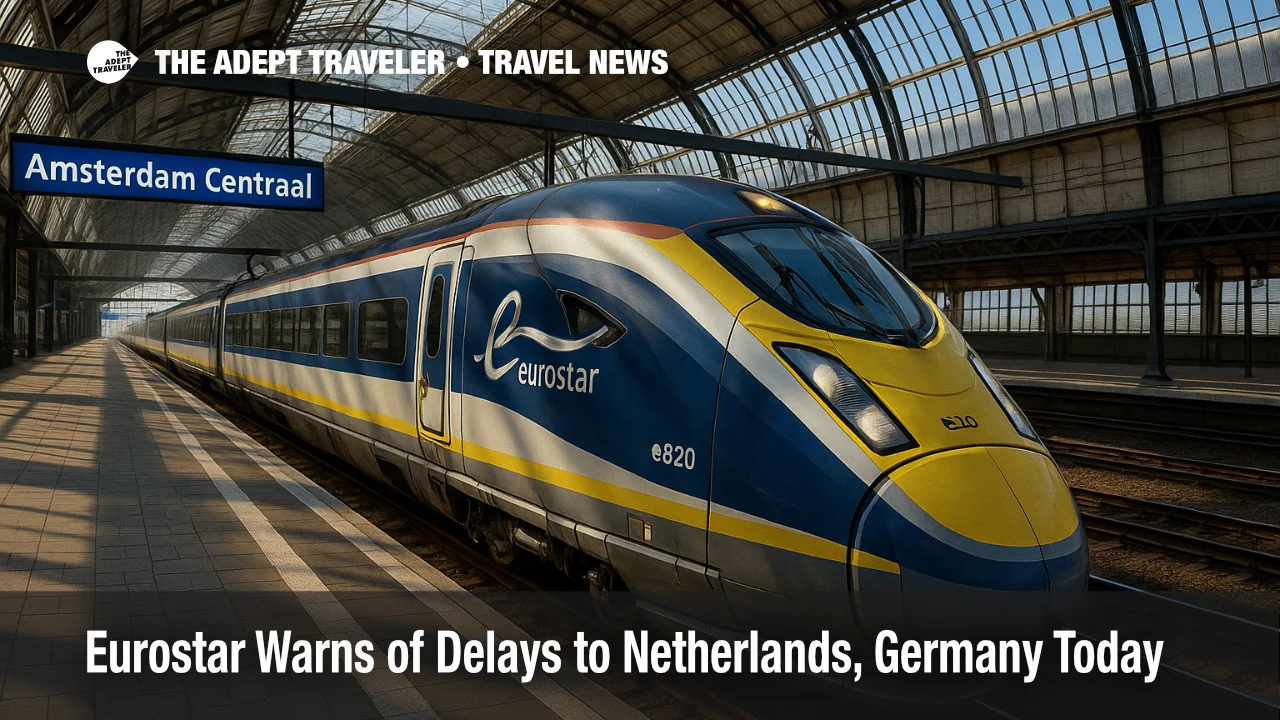Eurostar warns of delays to Netherlands, Germany today

Eurostar is advising travelers to expect delays on August 18 for services touching the Netherlands and Germany, with additional knock-on lateness at Brussels-Midi and Paris Gare du Nord. Live bulletins cite a train stopped ahead on the Dutch network, crowding at Amsterdam Centraal, and late platform arrivals on German routes. Separate engineering works in Belgium, running August 16 to 31, continue to lengthen some trips or cancel select trains.
Key Points
- Why it matters: Same-day Eurostar delays risk missed connections in Amsterdam, Brussels, and Cologne.
- Travel impact: Dutch and German network incidents, plus Belgian works, add minutes or cancel limited trains.
- What's next: Live updates will roll all day, with Belgian diversions scheduled through August 31.
- Rights: Delay compensation can apply from 60 minutes on eligible tickets.
- Tip: Build extra time at Brussels-Midi and Amsterdam Centraal, and avoid tight last-train connections.
Snapshot
Eurostar's live page for August 18 lists delays on the Dutch network due to a train stopped ahead, Amsterdam Centraal crowding, and "late arrival at the platform" on the German network. Belgian high-speed line works, active August 16 to 31, route some trains over slower tracks and cancel specific numbers, which can compress turnarounds at Brussels-Midi. Earlier this morning, a separate cross-border disruption between Hengelo and Bad Bentheim resolved after bus substitution, a reminder that Germany-Netherlands links can ripple into Eurostar connections via Brussels. Expect residual congestion during peak periods, especially where busy concourses slow boarding and gate flows.
Background
Eurostar's integrated network funnels London to Amsterdam and Germany connections through shared hubs with limited spare capacity. When a set arrives late, platforms and crews recirculate more slowly, and minor incidents cascade across corridors. Through August 31, planned Belgian works are reducing capacity between Brussels and the French border, extending journey times for some Eurostar and TGV services. NS International also warns that Amsterdam stations will be unusually crowded later this week because of multiple events, which can further slow boarding and connections around the Dutch capital.
Latest Developments
Eurostar delays to the Netherlands and Germany, what to know
As of midday on August 18, Eurostar flags three primary issues. First, a train stopped on the Dutch network has caused upstream delays on services touching Rotterdam and Amsterdam. Second, Amsterdam Centraal is "very busy," prolonging dwell times and pushing minor lateness into later departures. Third, German-network notices cite late arrivals at platforms, creating connection risk for Brussels-routed tickets toward Cologne and beyond. These operational shocks layer on top of Belgian engineering works that are diverting traffic and trimming selected trains through August 31. Travelers should confirm their specific train number, watch for equipment swaps that change seating plans, and allow generous buffers at Brussels-Midi.
Belgian engineering works keep pressure on timetables
Infrastructure works on the high-speed line between Brussels and the French border, scheduled August 16 to 31, are diverting Eurostar and TGV INOUI via slower routes. Journey times lengthen, and a small set of trains is canceled on specified dates, which tightens turnaround windows at hubs. Eurostar's bulletin lists affected trains during this period, alongside day-of-travel delay posts for the Netherlands and Germany. If holding tickets on the Belgian segment, check for retimes and consider earlier departures to protect onward connections.
Analysis
Today's pattern illustrates how cross-border rail concentrates risk. Amsterdam Centraal crowding increases dwell times, while a single stopped train on the Dutch network can block headways and slow following services. On the German side, late platform arrivals compress turnarounds for Brussels connections toward Cologne, Hanover, and Berlin. With Belgian works diverting traffic and canceling specific trains through August 31, spare capacity to absorb shocks is thin.
Operationally, three tactics help. First, protect connections at Brussels-Midi by selecting earlier legs and avoiding last-trains on Germany-bound tickets. Second, anticipate seat-plan changes when rolling stock is swapped, since coach maps and accessible spaces can move. Third, document delay times, receipts, and communications, then claim compensation if the arrival delay reaches 60 minutes under Eurostar policy and EU rail rights. For wider context on this month's Eurostar performance and practical planning tips, see our recent coverage in Eurostar delays: what to know today and Eurostar Issues August 6 Service Alerts for Brussels, Lille. For background on early-August repairs in France, review Eurostar Cancellations Ease After High Speed Line Repair.
Final Thoughts
Eurostar remains a fast, reliable corridor, yet today's Dutch and German incidents, paired with Belgian works, make schedules less forgiving. If traveling, verify your train number, arrive early to manage crowding at Amsterdam Centraal, and leave extra time at Brussels-Midi for platform changes. Claims for qualifying delays can offset costs, but prevention is better than paperwork. Plan buffers, avoid tight last-trains, and keep alerts on for evolving Eurostar delays.
